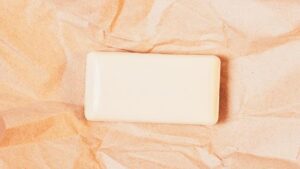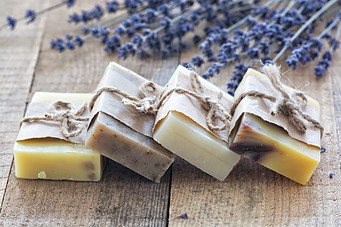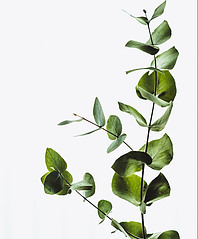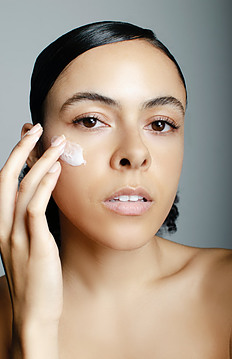The Wonders of Organic Bar Soap
The definition of organic bar soap is a soap made from a base natural oil or fat and reacted with lye such as sodium hydroxide. There are many benefits to using organic soaps because they are made from natural ingredients. The best type of soap for your skin is based on several factors, and not all soaps are equal.
What Makes a Good Soap?
Typical soap bars are made from the reaction between an alkali and an oil such as olive oil, tallow oil, coconut oil, and others. Soaps that do not contain additives such as surfactants, parabens, or other artificial ingredients such as fragrances, are usually dependable and safe for personal use.
You can purchase soap bars online from reputable soap makers. It is also possible to get your soap locally if you know where to look. A third option that we’ll discuss later is to make your own if you are so inclined.
Where Does the Moisture Come From in an Organic Soap Bar?

Moisture in a bar can come from two sources. Glycerin is a natural byproduct from the making of soap. A lot of soap makers retain the glycerin in their soap bars to hold onto the moisture. Commercial soap makers often remove the glycerin in their bars.
Sometimes soap makers use an excess of oil in their formulations to allow the soap to lubricate the skin. This tends to make the soap where it doesn’t form suds as much as other soaps – something you should consider if you like your soap to foam up well.
Depending on what other materials are added to the soap (color elements, essential oils, oatmeal or any other number of ingredients) it will have various other benefits. If moisture in your soap isn’t a great consideration, you may moisturize after you use your soap.
Here’s a little transparency: Our website contains affiliate links. This means if you click and make a purchase, we may receive a small commission. Don’t worry, there’s no extra cost to you. It’s a simple way you can support our mission to bring you quality content.”
Why is Organic Bar Soap Different From Commercial Bar Soap?
The chief difference between organic bar soap and commercial soap is additives. Often, fragrances are added to commercial soaps to enhance their unique smell and marketability.
I like to call commercial-type soaps created from additives as detergents rather than soap. Different compounds are added to increase suds, glycerin removal, dyes, colorants, and to add other desirable properties to the soap.
Organic soaps also contain additives but most of these are natural and make these types of soaps unique. These natural soap additives impart great properties to the soap and can be added to soap recipes. Aromatherapy ingredients, natural colorants, texture enhancers, and other ingredients can be added to the soap to make it desirable to the user.
Are Bar Soaps Better Than Body Washes?
Bar soaps agitate the surface of the skin to remove dirt, sweat, and bacteria that accumulate on the skin’s surface. As such, they can strip the oils from the skin. The skin will have to be re moisturized to replace this oil. This is neither a good nor bad thing as some soaps contain substances to assist with moisturizing.
Body washes often contain moisturizers to soften as they clean. I myself use a body wash for this reason. Using an organic bar can provide a different type of experience based on scents and texture that a body wash can’t provide.
On the other hand, peculiar types of skin conditions such as psoriasis, eczema, and others lend themselves to a body wash as a solution. Drier skin often works best with a body wash due to the moisturizers you will find in the body wash.
Again, the choice here is a matter of personal preference. Organic soap bars come in many sizes, shapes, smells, and colors. By looking around, you can find one that suits your tastes.
Where Can I Find a Good Quality Organic Soap Bar?
A good quality organic soap bar is easy to find. If you use your search engine, you will find many soap makers online. At your local natural store or market, natural soap bars are also plentiful.
It is just as easy to make your own as well. Soapmaking kits are available online. There are three methods for making soap at home.
The first is the cold process of soap making. In this process, a lye solution is first prepared to carry out the soap-making. The oils that are to be used are measured and added to a separate container. The lye solution is then added to the oils and stirred until the whole solution reaches a batter-like consistency. Additives are added and the final preparation is poured into a mold.
The second process is the hot process of soap making. Most home soap makers will employ a constant warmer such as a crock pot to warm the soap making reaction. The process is identical to the cold process with the exception that your heating source is first brought up to temp (the high setting on most crock pots) and the oils are added first.
The last method is the melt-and-pour method. In this method, you can take a soap making kit of fully prepared soap and melt it before adding it to a mold. In most kits of this type adding your additives to your melted batch of soap makes it easy for beginners to craft their soap to their liking.
Safety is paramount when making your own soap. Use protective gloves and goggles when using lye solution and store chemicals like in a safe place away from children. Use the right tools such as scales for weighing, molds and stirrers and measuring devices for additives when making soap.
Your Own Best Organic Soap Bar Solution
Organic soap is a wonderful product. It has many properties that are great for your skin. You can find a bar with all the properties you like (antibacterial, antimicrobial, moisturizing, aromatic, etc.) and make it or purchase it.
Cleansing solutions for your skin are as varied as individuals. Only you know what you prefer in terms of a skin-cleaning solution. Find your routine and follow it.
The one solution that may be best is to create your own. Experiment with making your own organic soap bar. The possibilities can be endless and when you find something you like, you may find making it at home beats going through all the commercial solutions at your store. The wonders of organic soap bars are endless.







I have seen these organic bar soaps in some beauty shops and I was always wondering how they are made and if they are any better than commercial ones. Your article provides some very useful information about them that I didn’t know so it was an interesting read. Thank you for sharing.
This article on ‘The Wonders of Organic Bar Soap’ hits on some important points concerning organic versus commercial soaps. I have often wondered about switching to an organic soap; however, I haven’t taken the time to research the subject in-depth. I commonly use a body wash as opposed to bar soap too. Compared to bar soap, is the process to create a body wash more complex? Or is the bar soap the preferred method of creating your own?
Making your own body wash is possible. There are recipes online for making your own body wash. To do so, you will need to make a “soap paste” and dilute it with water – this is accomplished by using potassium hydroxide lye instead of sodium hydroxide for a soap recipe. You will need to stir the soap paste as it cooks.
Take the soap paste and dilute it with water (1 part paste to 2 parts water). Add 10 drops of your favorite essential oil and about 4 tablespoons of a carrier oil like olive oil or jojoba oil. If you have mixed everything correctly, the mixture should last you up to a year. I encourage you to look online for specific recipes and experiment to see what works best for you.
I have often wondered why people would spend so much money on organic soap. This article helped me understand the process takes a great deal of time, patience, energy, experimentation, and dedication to achieve creating soap that is good for you.
Most soaps sold today have a ton of additives, some of which can be harmful to you. With organic soaps, you choose the soap that is most beneficial to your skin and any conditions such as eczema. Researching your soap can help you find the road to a life without some of the diseases that are brought about by large soap manufacturers. Their soap may not be cleaning you as thoroughly as you thought.
Jerry
I really enjoyed reading this article. It was very informative and helpful for someone who wants to switch to natural and eco-friendly soap options. I liked how you explained the benefits of organic soap for the skin and the environment, and how you gave some tips on how to choose the best organic soap for your needs. I’m curious about how organic soap can be made at home with natural ingredients and minimal waste. Do you know how long does homemade organic soap last without degrading or losing its quality? Thank you for sharing this valuable information with us.
There is no time limit on organic soap quality.